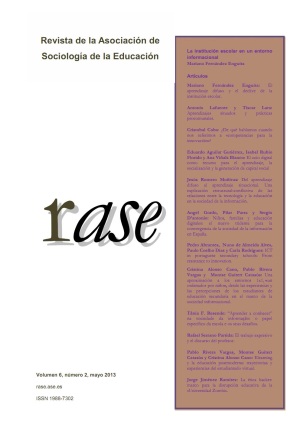Difusse learning and the decline of the school institution
DOI:
https://doi.org/10.7203/RASE.6.2.8351Keywords:
diffuse learning, ubiquitous learning, mobile learning, digital learning, school decline, education crisis Abstract
Abstract
Functionalist sociology (v. g. Parsons and Inkeles) defined modernity and development much in terms of specification. In opposition to the ancient community, which performed all kind of functions for human and social production and reproduction, modern society was to be distinguished by the establishment of separate spaces, times, institutions, agents, social processes, norms and values for family reproduction, economic production, religious cult, political relationships, education and learning and so on so forth. In the case of learning and education this meant the coming of separate institutions, mandatory schooling, the teaching profession, the academic year, syllabi and curricula, assessments and credentials, etc.
Now, in the internet age, the proliferation of information and communication technologies, social network services, new digital media and on-line communities is liberating education, and a fortiori learning, from the limits imposed by the modernizing specification process. Learning, as an implicit or as a purposeful activity, is brought back home, to the workplace, to media, to neighborhood or, as mobile learning, to wherever the learner is. And not only wherever, but also, to be ample extent, whenever, however, whatever...
 Downloads
Downloads
Downloads
Published
How to Cite
-
Abstract1803
-
PDF (Español)1456
Issue
Section
License
![]()
This work is licensed under a Creative Commons Reconocimiento-NoComercial-CompartirIgual 4.0 Internacional.




